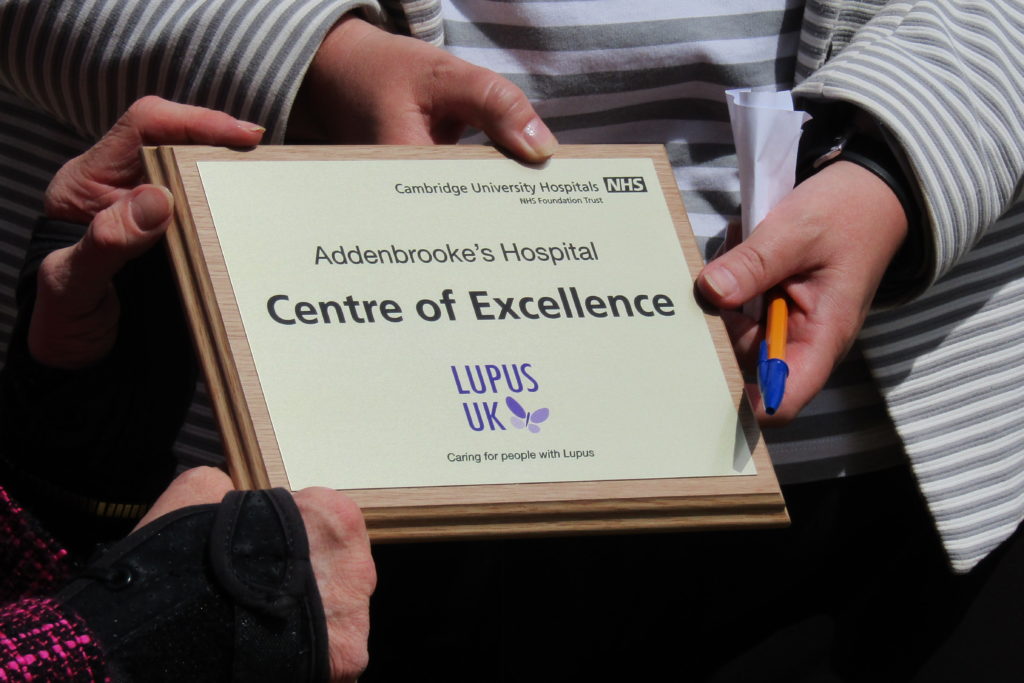
The Lupus Clinic by Thea Southwell Reeves
 November 20th, 2019
November 20th, 2019 Nakita Cambow
Nakita Cambow Blog
Blog 0 Comments
0 Comments
So you’ve heard me mention the lupus clinic (Addenbrooke’s) in my blog Living La Vida Lupus. My mum and I have been spending a lot of time  there recently. For anyone that’s interested, here’s a snapshot of what happens there and why it’s an important part of lupus treatment.
there recently. For anyone that’s interested, here’s a snapshot of what happens there and why it’s an important part of lupus treatment.
What is clinic?
The lupus clinic is held two mornings a week at Addenbrooke’s (learn more here) and provides an opportunity for all lupus patients under the care of the hospital to meet with their consultants. The frequency with which you need to attend clinic normally depends on the severity and status of your disease. This means if you have severe active disease you will probably attend more frequently than a patient who is in remission. A patient in remission may only need to attend clinic once or twice a year for a check-up – that’s the goal! Initially I attended clinic weekly, now trying fortnightly, and this will continue to reduce as my level of disease becomes more controlled.
However, from what I can gather from my visits so far, anyone who wants or needs to be seen is seen. This is really important and was a big concern for me leaving hospital. I was so worried about having to wait months on end for a clinic appointment while suffering with my symptoms, but I was reassured by the consultants that this is simply not allowed to happen. At the lupus clinic there is an ‘override’ button on appointment availability to just get people through the door.
Now I really like how the clinic works because it’s so flexible and laid back, but it might not be for everyone. Because everything is double-booked you don’t really have an appointment time and you’re not booked in to see a particular consultant. You just turn up, see which consultants are in that day and decide which one you’d like to see, decide which specialist nurse you’d like to attend your appointment, and then just wait for them all to be free at the same. Sometimes it can be quite quick and other times it can take an hour or so, but it’s not like I’m in a rush for anything…
So what happens?
All in all, I’m in clinic for about 3 hours. First of all I have to get there which is a challenge in itself. I’m still not great on my feet and walking long distances makes me very wobbly and tired. This week Mum dropped me off at the outpatients front door but I did manage to walk up the stairs to clinic so swings and roundabouts. At least I can actually walk and am not in the wheelchair anymore! I check-in, am weighed, have my heart rate and blood pressure taken, and hand in a urine sample. Then I go through to the clinic waiting area to take a seat. Usually, one of the specialist nurses spots me and comes over for a chat to see how I’ve been that week and which consultant I’d like to see. Then we just hang out until I’m called in. It’s a really friendly atmosphere and everyone is in the same boat so it’s quite chilled. It’s certainly very different to the haematology clinic and chest clinic I have attended before at Guy’s where the patient doesn’t have a say in who they see and there’s very little flexibility over timing.
The consultation itself is also attended by a Specialist Lupus Nurse and lasts as long as I need it to. Because my disease is still advanced and active, there’s a lot to go through but this should improve with time. We go through my blood results to review the antibodies, complement levels, inflammation levels, kidney function and liver function. I’ve probably forgotten others but those are the main ones.
I have my heart and lungs listened to and we also talk about other symptoms and side effects and make any adjustments to my medication. We usually also chat about the wedding because everyone wants to know how it’s going! Once the consultation is done I go for more blood tests. Then we’re done!
And what are they looking for?
Kidneys
High levels of anti-DNA antibodies and low levels of blood protein complement make it more likely that kidneys are affected by lupus. Patients with these conditions are susceptible to kidney disease so have regular monitoring of blood pressure and testing for blood and protein in urine. This is also why my consultants are kidney specialists. Steroids and immunosuppressants such as Mycophenolate (both of which are part of my treatment) are generally very successful at managing kidney inflammation. Up to 60% of lupus patients can develop kidney involvement, and if left untreated it can lead to kidney failure so it’s one of the more severe aspects of the disease. Between 10% and 20% of those with kidney involvement go on to develop kidney failure that requires dialysis or transplantation and generally this happens over a number of years. Read LUPUS UK’s booklet on lupus and the kidneys here.
[Information provided from the Lupus Trust]
In the UK, there are around 5,000 people in need of a kidney transplant to transform their lives and sadly hundreds die waiting due to a shortage of organs. The most common organ to be donated by a living person is a kidney. A healthy person can lead a normal life with one functioning kidney so it is possible to donate one to someone in need of a transplant. For more information on organ donation registration, check out Yes I Donate.
Lungs & Heart
Many lupus patients can also develop inflammation in the lining of the heart and lungs. When I was admitted to hospital I had inflammation in the lining of my heart. This has now been controlled by the steroids and the results of my cardiac MRI showed no permanent damage to my heart. I do still have Costochondritis (aka Devil’s grip!) which is inflammation in the joints between your ribs so I still have a lot of chest pain; unfortunately, this can take months to clear up. Read LUPUS UK’s factsheet on lupus, the heart and lungs here.
[Information provided from the Lupus Trust]
Antiphospholipid Syndrome
Also known as APS or ‘Sticky blood’ syndrome, this is where the immune system produces antiphospholipid antibodies which makes the blood more likely to clot. Between 30% and 50% of lupus patients are positive for antiphospholipid antibodies. I tested positive when admitted to hospital but another blood test in 6 weeks time will confirm if I have APS. This also affects contraception as the combined pill can increase the risk of blood clots so women with APS should take progesterone-only contraception. Read LUPUS UK’s factsheet on lupus and blood disorders here.
[Information provided from the NHS]
What is a Lupus Specialist Nurse?
Just what it says on the tin! These nurses specialise in looking after patients with a specific condition. I first encountered the specialist nurses when I was referred to haematological oncology. My Lymphoma specialist nurse was fantastic and the lupus ones are equally brilliant. As they deal with lupus patients on a daily basis, they are real experts in their field. You can contact them whenever you need to and they have loads of advice about managing symptoms and side effects – there’s nothing they haven’t seen. They’re really up-to-date on the research side of things, working closely with research trials, as well as new drugs and treatments. You chat to a specialist nurse at each appointment and they sit in on your consultation so are fully aware of your condition and treatment.
Unfortunately, not everyone in the UK has access to lupus specialist nurses. A recent report by GSK found that access to specialist lupus centres is varied across Europe and the USA. The problem with lupus is that there are many manifestations and it’s multi-symptom, which means that a multi-disciplinary team is required for effective treatment. This includes rheumatologists, nephrologists, and obstetricians as well as psychologists, physiotherapists and of course, lupus specialist nurses. The GSK report found that the structures needed to provide multi-disciplinary care are not always established across healthcare systems, meaning patients receive a ‘mish-mash’ of treatment from different teams, none of whom specialise in lupus.
I am SO lucky to be treated at a hospital that is a LUPUS UK Centre of Excellence.  This means the consulting team consists of specialists in rheumatology, nephrology and dermatology. There is also at least one consultant that specialises in lupus, with the others having a good working knowledge of the disease. Crucially, it also means access to Lupus Specialist Nurses.
This means the consulting team consists of specialists in rheumatology, nephrology and dermatology. There is also at least one consultant that specialises in lupus, with the others having a good working knowledge of the disease. Crucially, it also means access to Lupus Specialist Nurses.
The vision: that everyone with lupus has access to this level of care in the UK (and beyond!)
LUPUS UK – Funding Specialist Lupus Nurses
One of LUPUS UK’s aims is to fund a new Specialist Lupus Nurse each year.
The service Lupus Specialist Nurses provide can significantly improve a patient’s overall well-being and better their medication adherence thus, reducing pressure on GPs.
Key duties of a Specialist Lupus Nurse include:
- To run patient education clinics and drop-in sessions
- To provide longer patient appointments
- To offer advice through an email and telephone helpline
- To assist with lupus research
- To run ‘fatigue management’ workshops (almost 90% of lupus patients report experiencing fatigue, making it one of the most common symptoms)
- Support any local lupus groups
LUPUS UK has agreed in principle to fund a Specialist Lupus Nurse at St George’s Hospital in Tooting, London costing £261,239 over 5 years. Funds of £72,698 are still required to fund this role commencing 2020.



 ©2024 LUPUS UK (Registered charity no. 1200671)
©2024 LUPUS UK (Registered charity no. 1200671)